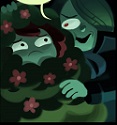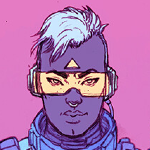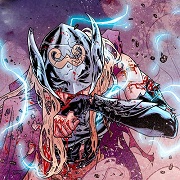|
The OP(s) on this topic is really good. I should have look for this topic on SA sooner. I've been writing for a few years now, been part of a writer's group that just had it's 2nd anniversary, and been a part of some writer's channels on Dischord. I've been also a part of a writer's group over at second life. I've been working a few stories, but haven't finished anything besides a couple short stories. I like to do the "discovery method" (i.e. panting), but I get to a point where I feel I wrote myself into a corner and I don't know how to go on, but I still really want to finish the stories. Mostly I write fantasy realism - modern setting stories with fantasy elements., One of my oldest stories is a novella ("Bird of Dawn, Bird of Dusk") about a boy who is about to run away from home during the great depression Seattle until a bird flies into his window and turns into a girl, and so he helps her get home. I wrote about 9 chapters and got stalled. One of my finished short stories is "Found at sea", a story about a young captain's daughter who's a victim of physical abuse who meets a mermaid off the pacific coast. I've done some editing on it a few times and set it out to publishers, but only got rejections. I'm currently working on another editing pass before I send it out again. Another story I've been currently working on, sort of inspired by Night in the Woods and a photograph is "Dog and Deer", a story of two teens - a deer-boy and a dog-boy who are best friends who are arrested for some vandalism. I wrote out some disconnected scenes, but I'm not entirely sure where I'm going with the story. It's turned into a story of runaway teens, and I don;t know if that's very interesting to me. I also have a incomplete fantasy story "Boy of Two Worlds" about a human boy who moves with his father to a country of lizardfolk, and the story is about the boy trying to fit in, and possibly fitting in "too well" for his father's liking, and the conflict of fitting in the two cultures of where's he from and where he's living. I wrote out a sort of complete arc, but I feel like I need detail (it has a lot of time skips) and more character development. I've done a few rewrites/edits of it now. Sorry if that was a bit rambley. I don't have any specific questions (I'm going to do a careful re-read of the OP, and I definitely want to take another look at the character development stuff since I think that's one of my main problems for my stories) If anyone is interested in taking a look at "found at sea" or even one of my more in-progress stuff I can start a topic and link it. I'd appreciate feedback. Foolster41 fucked around with this message at 03:54 on Jan 17, 2018 |
|
|
|

|
| # ? May 9, 2024 14:12 |
|
Foolster41 posted:The OP(s) on this topic is really good. I should have look for this topic on SA sooner. WTF someone read the OPs O__O Dr. Kloctopussy posted:Okay, I wrote a whole thing! I’m done now right? Ha ha ha, no. Dr. Kloctopussy posted:
Other people have given you some tricks for looking at grammar, etc. But the higher levels of editing are eventually going to be more important. Books like Elements of Style and Eat, Shoots, and Leaves are going to teach you correct grammar, but not necessarily how to find and fix incorrect grammar in your own stories. I think the best ways to learn to do that is to 1) look at the critiques you have received regarding grammar/punctuation, and make a list of your errors. Check your new stuff against these errors; 2) Read your stuff aloud as mentioned above. Most punctuation is read as a pause, of varying lengths, to separate phrases. In addition to catching weird sentence constructions, reading the punctuation pauses will show you if you've put punctuation in, the right place. (I did not) and 3) read a whole bunch of other (published) fiction, which will theoretically give you an education by osmosis of what "feels" right. That one might not work for everyone, but it seems to work for a lot of people, and you absorb way more than just grammar/punctuation, because you're seeing every element of fiction being executed at a reasonable level. There's also this book: https://www.amazon.com/Self-Editing-Fiction-Writers-Second-Yourself/dp/0060545690 "How to edit yourself into print" is probably an overly ambitious subtitle, but it may still be helpful. It covers editing on a more macro-level (nothing on grammar or punctuation to be seen), with sections on showing v telling, point of view, dialogue, beats, voice, and more. It also includes exercises to practice the skills it describes at the end of each chapter. I own this book, but have only flipped through it casually (I am so sick of reading about how to write at this point, ugh). One thing--and this is actually a caution about all writing books, I suppose--the authors have a specific way of writing that they consider "good," and if you follow everything they say as if it were gospel, you might be able to write that way, but it's certainly not the ONLY good way to write. This is another reason to read a lot of other fiction, because then you will see all kinds of ways that writing can be good, and learn to have a firmer grasp on deciding what bits of advice (from me or fancy published advice givers) you want to accept. These are some helpful questions the authors suggest asking yourself about show v tell at the end of that chapter, before going into more specific exercises: - How often do you use narrative summary? Are there long passages where nothing happens in real time? Do the main evens in your plot take place in summary or in scenes? - If you have too much narrative summary, which sections do you want to convert into scenes? Does any of it involve major characters, where a scene could be suet flesh out their personalities? Does any of your narrative summary involve major plot twists or surprises? If so, start writing some scenes. - Do you have any narrative summary, or are you bouncing from scene to scene without pausing for breath? - Are you describing your characters' feelings? Have you told us they're angry? irritated? morose? discouraged? puzzled? excited? happy? elated? suicidal? Keep an eye out for any places where you mention an emotion outside of dialogue. Chances are you're telling what you should show. Does anyone even read long posts anymore? Should I just stick to 140 characters of snappy one-liners?
|
|
|
Dr. Kloctopussy posted:Does anyone even read long posts anymore? Should I just stick to 140 characters of snappy one-liners? I always find them useful, what with being a scrub-level trashperson when it comes to writing. I also found the OPs in general to be more useful (and concise) than a lot of published books on writing. Though if I've learned anything about writing books it's that most spend a chapter on something that could be said in two pages, but boy howdy do we need six different poorly constructed examples and/or strained metaphors to make sure you know what we mean! (There are great books on writing out there, kids. Just make sure they're only a small part of your balanced breakfast, and get some goddamned words down on the page) MockingQuantum fucked around with this message at 23:48 on Jan 16, 2018 |
|
|
|
|
Dr. Kloctopussy posted:WTF someone read the OPs O__O Ahh I read these, but uhh, I have no idea what a narrative summary is. I think it's like a scene where your character is like 'AS YOU KNOW THIS IS THE SITUATION'? Thank you for the advice!
|
|
|
|
Maybe I should say, I skimmed with the intention of reading it more carefully later. I feel like problems with word choice (repition), basic grammer, etc. get fixed pretty well when i read my stuff to my writer's groups, and it's the more "macro" level as you said that I'm having trouble with ("okay, so where am I going with this plot?"). The reverse-summery idea is a good one. I'll check out that book. Thanks! I have a big collection now of books on writing (mostly on my phone on Kindle). I just finished reading "On writintg" by Steven King, and thought it has some pretty solid advice. Sitting Here posted:every time I open up the 2nd draft of this story im working on, I am overcome by loathing. Like if the words of my story were a person, I would forcefeed them drain cleaner. I'm probably going to die still wallowing around in first draft faffery. I can't even imagine going through this again when I finish my latest attempt at a novel. Basically this. I sit there for a bit with the doc open, and I think I don't really feel like writing after all right that moment and go play video games. MockingQuantum posted:(There are great books on writing out there, kids. Just make sure they're only a small part of your balanced breakfast, and get some goddamned words down on the page)
|
|
|
|
Exmond posted:Ahh I read these, but uhh, I have no idea what a narrative summary is. I think it's like a scene where your character is like 'AS YOU KNOW THIS IS THE SITUATION'? As an example, the part in my last Thunderdome entry where the guy mentions moving back in with his parents is summary, but the part where he describes the gig isn't. Sham bam bamina! fucked around with this message at 00:51 on Jan 17, 2018 |
|
|
|
Exmond posted:Ahh I read these, but uhh, I have no idea what a narrative summary is. I think it's like a scene where your character is like 'AS YOU KNOW THIS IS THE SITUATION'? The book goes into it in quite a bit more detail, but they give this as an example of a narrative summary and actual scene from The Great Gatsby: quote:The conversation was barely begun before I discovered that our host was more than simply a stranger most of his guests. He was an enigma, a mystery. And this was a crowd that doted on mysteries. In the space of no more than five minutes, I heard several different people put forth their theories--all equally probably or preposterous--as to who and what he was. Each theory was argued with the conviction that can only come from a lack of evidence, and it seemed that, for many of these guests, these arguments were the main reason to attend his parties. The Real Great Gatsby posted:
You can see how in the second example you are right there in the conversation, and therefore you get a lot more information about the characters. You get details, and good ones, that bring the scene and characters to life. BUT if you look closely, from the narrative summary, you get much more information about the attitude and ideas of the narrating character, who is practically invisible in the actual scenes. That kind of invisibility isn't inevitable in writing scenes, but it is a reoccurring feature of Nick Hornsby (the narrator in The Great Gatsby), and there's probably like a million undergrad essays on it. See, for example, this quote from the Shmoop analysis: Ultimately, Nick's major character trait – reserving judgment – allows him to be almost an "invisible" narrator, similar to a traditional third-person omniscient point of view. Which leaves us with a question (or three): why choose a first-person narrator at all? Why not just a third-person and be done with it? And how "invisible" and "non-judgmental" is Nick, really? Of course, there are even MORE undergrad essays, and actually published critical articles debating whether Nick is a reliable narrator, whether or not you can even believe the scenes he describes or his conclusions. So which is better? The author of Self-Editing obviously thinks Fitzgerald got it right, and I'm sure Fitzgerald himself would agree, but that doesn't mean that a scene would always be the right choice over the narrative summary. Not even over that particular narrative summary. I can imagine a different book where the narrative summary would be preferable to writing out a (different) scene illustrating the same information. Probably a murder mystery. These are the kinds of things to think about when you're reading, and hopefully (eventually?) when you are writing as well.
|
|
|
|
REMEMBER SPONGE MONKEYS posted:Do you read each others’ writing or? Nah, we just meet up once a month and read the stories we've written that month aloud (and drink).
|
|
|
|
Vulpes Vulpes posted:Nah, we just meet up once a month and read the stories we've written that month aloud (and drink). Aha! That sounds like a jolly good formula. Drink before reading for courage and after for the criticism.
|
|
|
|
Vulpes Vulpes posted:Nah, we just meet up once a month and read the stories we've written that month aloud (and drink). That's what my weekly group does too (only we only drink coffee/tea, since it's in the morning, though the cafe does also serve wine and beer...). Our group has some pretty good rules set down for how to critique ("from the 'I'", meaning phrasing it like "I thought.." rather than "this is wrong", I forget the other rules. I think it's the "milford style"?).
|
|
|
|
I kind of can't recommend a writing group like that strongly enough. I was super skeptical when a friend put it together but it's made me productive as hell. If I don't write a story every month, I won't have anything to read, so I write a story every month. I've probably written more in the last year than in the previous five.
|
|
|
|
Yeah i wouldn't write a thing if i didn't do thunderdome.
|
|
|
|
sebmojo posted:Yeah i wouldn't write a thing if i didn't do thunderdome. now youre making td look bad 
|
|
|
|
Vulpes Vulpes posted:I kind of can't recommend a writing group like that strongly enough. I was super skeptical when a friend put it together but it's made me productive as hell. If I don't write a story every month, I won't have anything to read, so I write a story every month. I've probably written more in the last year than in the previous five. Yeah, that was the goal behind wanting to being in this group (besides getting great feedback) in theory. My current writer's block has been overpowering that though, but I'm still trying to keep myself writing. I keep considering not going, so I'll feel like I have to write something to go again, but I don't want to miss out on the comradery and hearing the stories, so I go every week.
|
|
|
|
flerp posted:now youre making td look bad good point, that's your job: sorry.
|
|
|
|
Foolster41 posted:I keep considering not going, so I'll feel like I have to write something to go again, but I don't want to miss out on the comradery and hearing the stories, so I go every week. A weekly group seems bananas to me! Do you all have finished work every week?
|
|
|
|
Vulpes Vulpes posted:A weekly group seems bananas to me! Do you all have finished work every week? I used to do a weekly group where we'd share 2,500-5,000 words we'd written that week. Is this not what most people do?
|
|
|
|
I had a weekly group for a bit and really enjoyed it, but it was a bit strange because we had a poet, a sketch comedy writer, a fiction short story writer, a non-fiction short story writer, and two folks writing novels, myself included. Everyone enjoyed giving a lot of different types of feedback, but it fell apart after a couple of months. I found it quite the struggle to get proper critique of my novel. A couple of times I tried to do an entire chapter, which would come in around 2500-5000 words, but it was such a large volume compared to the folks writing shorter pieces that I felt like I only got the broadest of feedback, and I felt guilty about taking up so much time. When I moved to partial chapter sections, folks didn't have full context and I found myself needing to answer a lot of questions during the critique, which kind of defeats the point. And if someone missed a week they'd have even less context the next week. I remember always feeling lost when the other novelist read as well, but that could just be that he was a fantasy writer who focused more on his world-building than his narrative. Has anyone found a successful balance or is workshopping a novel piece-by-piece just inherently setting one's self up for failure? Or am I approaching it wrong? feedmyleg fucked around with this message at 17:08 on Jan 17, 2018 |
|
|
|
Dr. Kloctopussy posted:words Self-Editing for Fiction Writers is loving fantastic, dude. Read it all the way through. You won't regret it.
|
|
|
|
Vulpes Vulpes posted:A weekly group seems bananas to me! Do you all have finished work every week? Naerasa posted:I used to do a weekly group where we'd share 2,500-5,000 words we'd written that week. Is this not what most people do? Yeah, we share like up to 8 pages, which is usually a chapter of a novel. I just caught up with the thread, and someohne mentioned here doing characer sheets. I used to fill those out pretty religiously, and I had a sort of feeling of it not being very helpful, but I filled them out, because maybe it'll help.  Like, why does their favorite food matter? Like, why does their favorite food matter? I've used also the Myers Briggs types and Ash's guide to RPG Personality, though even those I'm questioning how much they are really helping me. Thought one thing I've found helpful (and writers are surprised by this) is mining dating sites for questions. I made an account for OK Cupid just for this reason. I've also been havingt my chacters answer "never have I ever" questions, though I skip a lot of them. I forgot another story I was working on, that I feel like has the best character development. Rebel 5 which is a sciencce ficiton dystopia story of teen rebels trying to free their parents from the goverment. I think having a sort of "theme" for the characters helped (actually 5 of the 6 atttributes from D&D, Strength, constitution (He's also Wisdom), Dexterity, Intelligence and Charisma). The idea I had was a more episodic feel story, taking inspiuration partly in terms of tone from stuff like Teen Titans and Star Wars Rebels. I wrote a fewe stories but got a bit stalled again on where I'm going with the main plot. I feel like some of the characters aren't quite fleshed out as others. I tried to give them each a secret. Trang, the smart one used to live on the street and was part of a sort of "gang" (though they never did drugs or serious crimes, mostly stole and did vandalism). Avin (The Face) lied about having parennts that are in prison for being rebels. His parents work for the goverment, but he lied because he doesn't like the goverment, and wanted to join.
|
|
|
|
I've tried those character sheets before when I just started writing, and they weren't very helpful. Recently I decided I needed to "get to know" a bunch of my characters, so I wrote interview questions. "What is something that irritates you", "what are you afraid of", "what do you want to be remembered for", that sort of thing. Obviously I'm working under the assumption that they would be willing to answer touchy questions because even if it's in character for them to say "gently caress off" and nothing else, it's not helpful. I like this because it allows for exploratory writing and some wiggle room with details while hopefully keeping the core of the character intact. It's good practice writing their voice to have them answer it, and the fewer but more meaningful questions you have, the fewer things you have to keep in mind when writing.
|
|
|
|
Dr. Kloctopussy posted:Does anyone even read long posts anymore? Should I just stick to 140 characters of snappy one-liners? I enjoy your long posts and have read the OP multiple times, it's useful and concise and helps whenever I'm flagging with my writing. feedmyleg posted:Has anyone found a successful balance or is workshopping a novel piece-by-piece just inherently setting one's self up for failure? Or am I approaching it wrong? Take this with a bag of salt, all experiences are different, etc, but I had the same issues until I decided to focus on writing each novel start to end, often even second draft, before seeking critique. Treating each individual part of a novel as a critique exercise just bogs the whole thing down, at least for me. It was a difficult habit to kick, but it helped in the long run.
|
|
|
|
I haven't finished a novel myself, but a friend who has published a few moderately successful books said she prefers to wait until she's finished a few drafts of a book before sharing it with critique groups, since she's found writing groups often aren't helpful in determining whether you're telling the story you intend to write; they are, however, useful in determining if you're getting that story across in a way that's intelligible and engaging to people that aren't you. Those are mostly her words, I think I have a sense of what she's saying, but like I said, haven't finished a book myself so YMMV
|
|
|
|
|
Hungry posted:Take this with a bag of salt, all experiences are different, etc, but I had the same issues until I decided to focus on writing each novel start to end, often even second draft, before seeking critique. Treating each individual part of a novel as a critique exercise just bogs the whole thing down, at least for me. It was a difficult habit to kick, but it helped in the long run. --- I'm once again trying to get to work on my old stories, and feeling stuck on a point. In the "Boy of two worlds" story, like I said it's about a human father and son (The MC, about 8 at the beginning. His name is Zack) who moves to a world of lizard-folk. Set in the vague "medievil-esque" era in fantasy. They live with a lizard-folk family (including a son who's the MC's age named Laila). I was thinking Laila would have a small gang of 4-5 friends he'd already know, and the people Zack's trying to impress/get to know. In the story they'd play a sports game together (sort of like soccer), but basically ignore him. My first few drafts I left them as pretty blank slates, but doing another rewrite I want to give them more personalities (Which would help me fill time skip holes in the story). One character I have vaguely is a kid who's older who's into sports. But I'm not sure how to write these characters, even doing research on writing ensemble casts, and I feel like I'm somehow going at this all wrong. Anyone tried to write a sort of supporting ensemble cast like this? Any advice? ---- The story actually started as the world and culture first, and then I began writing the story around "what would happen if humans came to this world?". Culturally they see kids (under 10) as being innocent that it doesn't matter if they wear clothes or not, and kids prefer not to (it's hot, and fits with some research I did on this, on time period/climate). Basically, kids wear clothes only when doing chores, so Zack's wearing clothes and they don't want to interact with him because of the taboo. Zack then goes to a pubic bath with Laila and embarrassed to find it's mixed sex. (Laila is trying to get them to meet to talk "on equal footing" and doesn't see what the big deal is) When Zack eventually gets the courage to strip (it's in a courtyard of a house) his dad spots him and yells at him to not do that again. The dad wants Zack to fit in of course, but he has ideals of how a human "should behave". So the conflict is between obedience to his father and wanting to fit in. Foolster41 fucked around with this message at 00:13 on Jan 18, 2018 |
|
|
|
crits after a second draft make the most sense to me because you generally write a scene and identify obvious problems that you need to fix in a single edit session. example i had was i put a bit of emphasis on a jacket because a protag needed to hide something in a pocket later. i ended up writing the scene where the protag needs to slip the item by another person differently because it made more sense when the the information of several scenes came together into a single high-tension scene. i ended up with people going "whats with the jacket" and i knew the problem was there, but now the whole jacket thing distracted from other problems the piece may have had. point being: if you have glaring, fixable problems, the hotter parts of your mess are going to mean your test readers don't pick up on the poo poo you truly need to fix. when you resolve it, i think they'll be looking for those problems being fixed instead and again miss anything you need being caught. first drafts are garbage test reads because you, the writer, already know 90% of the fixes that need to take place. don't waste your test readers time on that.
|
|
|
|
sebmojo posted:It's awesome to post and seek feedback, but don't do this. If you're asking for help, make sure you've either done as much as you can to make it good first, or at least pretend you have. Did you even proofread it? I apologize. I'll endeavor not to make such an error again. I didn't realize what a poor jesture that was and will make sure not to do so again. Safety Biscuits posted:The mighty barbarian hero Sebastian. I wanted the hero to have a name that sounded more hispanic, though, ironically, I guess it really isn't that hispanic. More traditional spanish. I wanted to hero to come from, essentially, a fantasy Puerto Rico. I wanted someone with more ties to my traditional homeland. But, I'll admit the name was a poor choice. flerp posted:besides the terrible proofing and cliches, among other things, this story is just really boring. for an anthology that's supposed to be about one character, this does not convince me, in any way, to keep reading more of sebastian. sebastian is a dull, generic character who's character traits are "stoic" and "has a sword" and the world you present to me is paint-by-the-numbers fantasyland with nothing surprising or interesting. Alright, story is boring and the character is two dimensional and flat. Got it. I need to give him an intrinsic motivation to go along with this as well as some more elements to help better define him and interest the reader. Also, the world could use some sprucing up. It's supposed to be a fantasy version of pre-european American being invaded by fantasy Europeans as a background element. Maybe I should play with that more. Unfunny Poster posted:I'm not much o a critic but I'll give it a whirl this week. Sounds like a story thing I could dig. Thank you. I apperciate that. Though, I am already working on the second draft. I recognize the first had issues. Phil Moscowitz posted:What This made me laugh too hard.
|
|
|
|
Foolster41 posted:Could you be more specific on what you mean? I tend to not want to wait after doing some basic editing to get my work out there and read it to my group and get feedback. I'm wondering if maybe waiting is a good idea. (though, like you said, all writers are different, so maybe it's a matter of this works better for you) It's not about waiting, it's about treating a novel as a unified whole. Polishing/fixing each scene with critique as you go is a little like being unable to see the forest because of all the trees in the way. In my experience it is more valuable to finish a novel's first draft quickly so that you can iterate it again in a second or third draft, than it is to feed each piece of first draft material into a critique group and try to fix whatever's wrong with that piece. That piece is not going to survive the changes you make after finishing the first draft. If you shine each scene before finishing the whole novel it engenders the wrong attitude - that these scenes or chapters you've worked on are now set and concrete, because they're important, because you made them good, right? They were critiqued and you fixed their problems. You put hours of work and thought into them. You don't want to have to scrub them out and rewrite them. But once you finish a novel and zoom your perspective out to take in the whole thing, you're probably going to have to rewrite almost everything, re-order and re-structure, add or remove characters, entire sub-plots, themes, etc. It's impossible to gain that perspective on a story without finishing it whole. So, I find it more useful and productive to focus on iterating a new draft quickly so I can step back and take in the whole, rather than polishing pieces that are likely to fall casualty when I reach the end of a draft anyway. The ones that survive to the end of a second draft, those are going to be worth critique.
|
|
|
|
I frequently use beta readers for my stories (not for TD, I don't need the cabal leaving any crow heads in my bed) and I never bother giving them the rough draft, because by the time my second draft rolls around, everything will have changed so much that the feedback I got would essentially be worthless. If it makes more sense, think of it this way: you don't want to make your beta readers read something before you yourself have read it. And when you're writing it, you're not reading it. So make sure that you give anything you're working on one whole reading yourself before you pass it off to someone else. (Novels are a bit of a different beast because of their size, but still, you'll probably catch so many things to fix, add and remove on an edit pass on your own that it's not worth getting beta readers until then.)
|
|
|
|
The only person who reads my first drafts of anything is my wife because she's a brutal critic and can cut through a lot of my bullshit.
|
|
|
|
With everything I write, my wife makes me explain the story to her, out loud. It's amazing how much it helps, and how obvious it becomes that I tend to start writing with ideas that are not at all fully-formed. It's easy to fool yourself that something will just work when you need it to. On a different note, how do you all handle reading drafts? My writer friend I quoted earlier prints out her entire book, usually two book pages per sheet, more or less double spaced, smallish font, and just goes through it with a red pen. I know this is obviously how manuscripts were edited for literal centuries, but in the day of digital existence it seems really wasteful (not to mention, I feel like I'd forget why I felt some edit in Chapter 1 was so important by the time I got to the end). On the other hand, editing in a word processor as you're re-reading a completed draft also seems like you might end up in the same situation above-- too stuck on the trees to get a genuine picture of what's broken with the forest as a whole.
|
|
|
|
|
I'll typically read through a first draft twice: once in either hard copy or kindle (doing much more of the latter these days, which saves boatloads of both literal and monetary paper), looking for big story problems, changes, corrections etc. and making note of them, and then I'll read it again in a word processor for a more refined line edit. I consider the end result of both these reads and edits the second draft, which is what I'll hand out to beta readers. From then on its almost exclusively word processor edits until I get near the end, when I'll start reading hard copy/kindle again to get a feel for how everything's coming together.
|
|
|
|
I just read through it in Scrivener, making changes as I go.
|
|
|
|
I print everything out and edit by hand, usually more than once. I also write about half my stuff by hand, then type it up.
|
|
|
|
MockingQuantum posted:On a different note, how do you all handle reading drafts? My writer friend I quoted earlier prints out her entire book, usually two book pages per sheet, more or less double spaced, smallish font, and just goes through it with a red pen. I know this is obviously how manuscripts were edited for literal centuries, but in the day of digital existence it seems really wasteful (not to mention, I feel like I'd forget why I felt some edit in Chapter 1 was so important by the time I got to the end). In her role as an Author, my wife likes to print out her entire manuscript and mark it up, then go back and edit in scrivener. She says it has something to do with the physical paper over the words on the screen creating a bit more of a mental compartmentalization for her. Also it forces her to edit the whole thing instead of jumping at changes immediately. In her role as an Acquisitions Editor, she goes through the submissions in word and annotates with comments. Same for when she is doing developmental editing. Shipping manuscripts is expensive, time consuming and wasteful so this works better for her in this scenario.
|
|
|
Dr. Kloctopussy posted:I print everything out and edit by hand, usually more than once. I also write about half my stuff by hand, then type it up. I've started doing that too, at least for scenes/passages/chapters I know I'm going to have a hard time with, since the act of typing it up tends to be a natural "soft" editing step where I catch dumb grammatical or structural issues without dwelling too much on content or word choice or whatever.
|
|
|
|
|
Hungry posted:It's not about waiting, it's about treating a novel as a unified whole.... Ok, thanks for the explanation. That makes sense, and seems like the sort of problem I had with "Bird of Dawn". I guess what I mean by "waiting" is, not bringing my self-edited second drafts (I always try to do at least to one editing pass on each chapter) each chapter as I write them to my writer's group, but instead write the entire novel and THEN start bringing them chapter at a time. It's a hard habit for me to break. (Though, either way, I need to actually write something) I think the people who are reading novel chapters in my writer's group mostly have what their bringing finished.
|
|
|
|
I like letting people read first drafts as I write them because I figure if I can keep a bunch of acerbic goons even a little interested in my lovely draft it bodes well for the project. Granted I'm still in the process of loving up a bunch of novels but I reckon I'm gonna figure it out any day now.
|
|
|
|
MockingQuantum posted:On a different note, how do you all handle reading drafts? My writer friend I quoted earlier prints out her entire book, usually two book pages per sheet, more or less double spaced, smallish font, and just goes through it with a red pen. I know this is obviously how manuscripts were edited for literal centuries, but in the day of digital existence it seems really wasteful (not to mention, I feel like I'd forget why I felt some edit in Chapter 1 was so important by the time I got to the end). I find I slow down and really read when it's printed out on paper. So I do print my draft, double-spaced on paper and go through it. When I do try and edit on my laptop it isn't as effective.
|
|
|
|
Foolster41 posted:Yeah, we share like up to 8 pages, which is usually a chapter of a novel. Way back when I started out I tried using the character sheets I found in some book on writing, personality tests, whatever, and I had the same feeling. All that poo poo I filled out ended up being completely forgotten by the time got down to writing the story. It's just dog loving. Since you mention D&D, think of it this way: you don't really figure out your characters until you put them in play. On the other hand, this can actually help: CantDecideOnAName posted:I've tried those character sheets before when I just started writing, and they weren't very helpful. Recently I decided I needed to "get to know" a bunch of my characters, so I wrote interview questions. "What is something that irritates you", "what are you afraid of", "what do you want to be remembered for", that sort of thing. Obviously I'm working under the assumption that they would be willing to answer touchy questions because even if it's in character for them to say "gently caress off" and nothing else, it's not helpful. I don't know if I ever posted this before, but taking the questions from this ridiculous article and using them to write interviews of my main characters gave me so much background material to work with I never had to fill out another dumb sheet for them again. Stuporstar fucked around with this message at 20:04 on Jan 18, 2018 |
|
|
|

|
| # ? May 9, 2024 14:12 |
|
Stuporstar posted:On the other hand, this can actually help: These are good questions. Thanks! This will maybe help me at least with Dog and Deer. I guess the problem with "Boy of Two worlds" is, I don't even know where to start with creating characters, so I feel like I don't know how to answer questions like this.
|
|
|


























